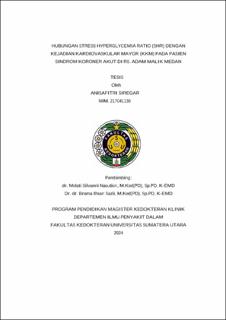Hubungan Stress Hyperglycemia Ratio (SHR) dengan Kejadian Kardiovaskular Mayor (KKM) pada Pasien Sindrom Koroner Akut di RS. Adam Malik Medan
Relationship between Stress Hyperglycemia Ratio (SHR) and Major Cardiovascular Events (MACE) in Patients with Acute Coronary Syndrome at Adam Malik Hospital Medan

Date
2024Author
Siregar, Anisafitri
Advisor(s)
Nasution, Melati Silvanni
Sazli, Brama Ihsan
Metadata
Show full item recordAbstract
Background: Acute hyperglycemia in patients with acute coronary syndrome (ACS) has been associated with major adverse cardiovascular events (MACE). The stress hyperglycemia ratio (SHR) is considered a potential marker for predicting MACE in ACS patients.
Objective: To evaluate the relationship between SHR and MACE among ACS patients at Adam Malik Hospital, Medan.
Methods: This study employed a retrospective analytic design by collecting data from the medical records of ACS patients treated at Adam Malik Hospital, Medan, during 2022–2023. Inclusion criteria included: confirmed ACS patients (who underwent coronary angiography), while exclusion criteria were: patients with an E-GFR <30 ml/min and those with malignancies, liver diseases, hematological disorders, or infections (sepsis). The chi-square test was used to evaluate the relationship between variables, with a p-value <0.05 considered statistically significant.
Results: A total of 100 ACS patients met the study criteria, with an average age of 59 ± 10.3 years, and 78% were male. The mean SHR among the study subjects was 1.09 ± 0.36. MACE was recorded in 64% of patients, including heart failure in 44%, rehospitalization in 12%, stroke in 9%, and mortality in 31%. SHR was found to have a significant relationship with overall MACE (p <0.001) and heart failure events (p = 0.001). However, no association was found between SHR and stroke, rehospitalization, mortality, or 3-point MACE (p >0.05).
Conclusion: SHR has a significant relationship with MACE but not with 3-point MACE.
